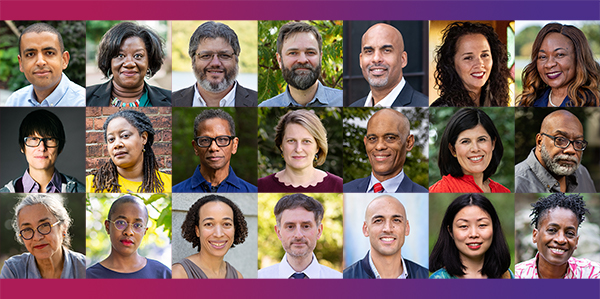It is a great pleasure for me, as a newly minted citizen of Chicago, to welcome you to this lecture in the MacArthur Fellows Science Series.
One of the first things I learned as MacArthur’s president is the Foundation’s deep commitment to Chicago. This city is a center of intellectual and cultural achievement, built through a family of world-class institutions. We take great pride in supporting their work and mission, and I look forward to getting to know all of them.
It is good to speak for the first time here at Harold Washington. Libraries have been at the core of creative thought across history; MacArthur is partnering with Chicago Public Libraries in ensuring that they will also be at the edge of new trends. Last year, we committed $500,000 toward a new digital media youth program that will help transform our libraries into a learning network for the information age.
This lecture series was conceived as part of Science Chicago; the world’s largest science celebration — which MacArthur helped develop and plan. Led by the Museum of Science and Industry, 140 Chicago institutions reached out to four million people this past year to raise knowledge and awareness of science. Thousands of inter-related activities and events, many of them free, covered topics ranging from particle physics to wetland conservation, robotic surgery to the history of DNA.
Why does MacArthur have this concern for science? The first reason derives from our practical experience.
MacArthur works in 60 nations across the world, in fields as varied as human rights, arms control, conserving biodiversity, and making childbirth safer. In each, we see science and technology growing in importance. In Africa, atrocities are being deterred by the eyes and ears of cell-phones and satellites; in the Amazon, air-borne sensors are recording species in danger so that we can act to preserve them; in remote villages in Nigeria and India, technology developed for the battlefield is saving women’s lives by stopping post-partum hemorrhage. We need better science to accelerate positive change.
The second reason is grounded in our concern for democracy and effective public policy — the rationale for our longstanding commitment to public media and high-quality documentary films. The public needs to be equipped and informed to assess scientific issues such as climate change, energy policy, stem-cell research, and end-of-life care. Each of these connects to a current political debate; decisions taken now will determine our common future. They must be sound ones.
This series brings some of our best researchers into dialogue with the public, to draw attention to important practical and ethical issues related to science, and to share the power of new ideas.
So I am pleased to introduce a scientist who embodies the capacity of science to change lives and build a better world, Dr. Funmi Olopade.
Dr. Olopade is one of the world’s most creative hematology oncologists. She directs the Cancer Risk Clinic at the University of Chicago Hospitals and is a professor in U of C’s departments of medicine and human genetics.
She is also a 2005 MacArthur Fellow — or “genius,” as the media prefers. Each year, MacArthur selects a group of around 25 people of exceptional creativity and accomplishment. They receive a call, out of the blue, that they will receive a five-year, $500,000 fellowship — no strings attached. Today we announced the class of 2009, which includes an infectious disease physician, an ornithologist, a realist painter, a photojournalist, a bridge engineer, a climate scientist, an economist, a papermaker, a mental health lawyer, and a poet. Each has made a significant and original contribution that has improved our world.
The Foundation honored Dr. Olopade for her groundbreaking work that took research findings in advanced molecular genetics and shaped them into innovative clinical practices in the United States and abroad.
Dr. Olopade discovered that breast cancers in African women can produce gene expressions significantly different from those in women of European descent. These expressions respond less readily to conventional treatments.
She set about applying that knowledge, determined to improve how breast cancer was detected, treated, and prevented among black women. Her Cancer Risk Clinic, founded in 1992, uses genetics and family history to drive preventive care and improves the lives of young breast cancer patients through practical interventions.
Dr. Olopade grew up in Nigeria and returns frequently to teach and conduct research. She earned her medical degree from the University of Ibadan, served as a medical officer at the Nigerian Navy Hospital in Lagos, then trained in hematology and oncology as a postdoctoral fellow at the University of Chicago. She has been on the faculty at U of C since 1991.
Her many honors include the University of Ibadan Sir Samuel Manuwa Gold Medal for Excellence in the Clinical Sciences, the American Society for Clinical Oncology Young Investigator Award, and the Doris Duke Distinguished Clinical Scientist Award.
Funmi Olopade embodies the promise of science at its best — concerned, engaged, constructive. She has bridged disciplines, cultures, and continents in her quest to save lives.
This evening’s event takes the form of a conversation between Dr. Olopade and Dr. Mary Anne Molloy, whom many of you will know as medical contributor on NBC 5 TV Chicago. She is an eminent cardiologist, trained at Northwestern and Chicago Wesley Memorial, and with current staff appointments at Loyola Medical Center and Elmhurst Memorial Clinic.
Dr. Molloy and Dr. Olopade will discuss the topic “Nature, Nurture, and Breast Cancer.” At the close of the discussion, they will take questions.
Please welcome them warmly.




